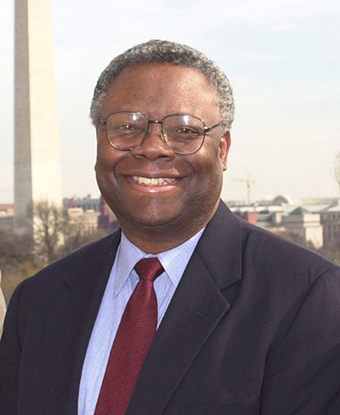Last updated: September 9, 2021
Person
Craig Manson

Department of the Interior
Craig Manson graduated from the Air Force Academy in the mid-1970s. From 1976 until 1978 he was assigned to the 44th Strategic Missile Wing at Ellsworth Air Force Base. His initial assignment was as a missileer in the 66th Strategic Missile Squadron. After a year, he became an instructor in the training division of the Operations Directorate. As the Assistant Chief of Unit Proficiency Training he worked with a team of officers that was responsible for training missileers in various aspects of the weapons system. In 1978, Mr. Manson left missile operations to attend law school. He then helped found the Air and Space Law Program at the Air Force Academy. In 2002 when Minuteman Missile National Historic Site was formally established, Mr. Manson was the Assistant Secretary of Fish and Wildlife and Parks for the United States Department of the Interior. He left that position in 2005.
Mr. Manson was interviewed for the park's oral history collection in the summer of 2002 and that fall participated in the ceremony that marked the establishment of Minuteman Missile National Historic Site.
Below are some excerpts from his 2002 interview.
What are the common misperceptions that you encounter or encountered about being a launch control officer or being involved in the missile business?
Well, I think that a lot of people – here’s the minor one that irritates launch control officers – everybody talks about a button. It’s not a button, it’s a key. [laughs] But beyond that, because of television and movies and in part because of the image the Strategic Air Command cultivated for itself, people have the idea that missile launch officers were somehow bloodthirsty killers with few morals and no soul and ready to kill millions of people with the turn of that key. And that’s just not so. One of the things that’s made America great is that we do not have a warrior class in America like some ancient civilizations or even some societies today. Our military is drawn from ordinary people living in ordinary communities, growing up with the same values that they perceive around them and missile launch officers come from that same group of people – ordinary Americans with mainstream values. And the whole military is that way. And in a democracy, that’s essential. You can’t have – that’s why we haven’t had a military coup in America, because we don’t have this warrior class, we have ordinary people with ordinary values. And so the question frequently is, “well, you know, how could you do that job knowing that you might be called upon to participate in a war of nuclear devastation?” And I think there’s a couple of things that people have to keep in mind.
One, the majority of missile launch officers, even though they’re fairly young officers, the majority are married and many of them have children and families, and that’s crucial to keep in mind. Two, although no one ever said to a missile officer, “we are categorically ruling out a nuclear first strike,” because of their faith in American values, I think we were all convinced that America would act only in the best interests of America and the world and not in an unreasonably aggressive posture for no reason at all. And then there’s kind of a more pedestrian sort of reason, too. I think that most missile launch officers were not necessarily convinced that the ultimate would ever really happen. They’re ready to do it if it did, but I think they weren’t, they probably weren’t really convinced that it would happen. But let me go back to the issue of having families. We also knew that if we were called upon to execute our duty, we would be doing so either in defense of, or in retaliation of a strike that either did or would kill our families and our communities. So that’s, that was of great importance. And I think that that’s, again the misperception is that somehow we were disconnected from ordinary values, and that’s not the case at all.
Did you feel at the time that the underground control center would survive a nuclear attack?
I thought it might, although the real question was would there be any point in that. Two reasons. One, it might survive a direct hit, but one, could you get out of it, even if it did? And there was this escape tube that was filled with sand and you could crank open the – theoretically – crank open this escape hatch with this giant wrench. It had a big bolt on it. And theoretically the sand would all fall out and you could climb your way out of the thing. But we all thought that if it took a direct hit, the sand would turn to glass or something [laughs] and there’d be no way to get out. And the other thing was in the scenarios that we were trained to anticipate, the question is, what would you find when you got out? So the question about whether it actually would survive a direct hit was academic really.
And I always used to say that if there was a war, and if I did survive, then the first place I was going was Pierre, because I was going to declare myself the military governor of South Dakota. [laughter] And I might as well have, I suppose, if something like that happened.
